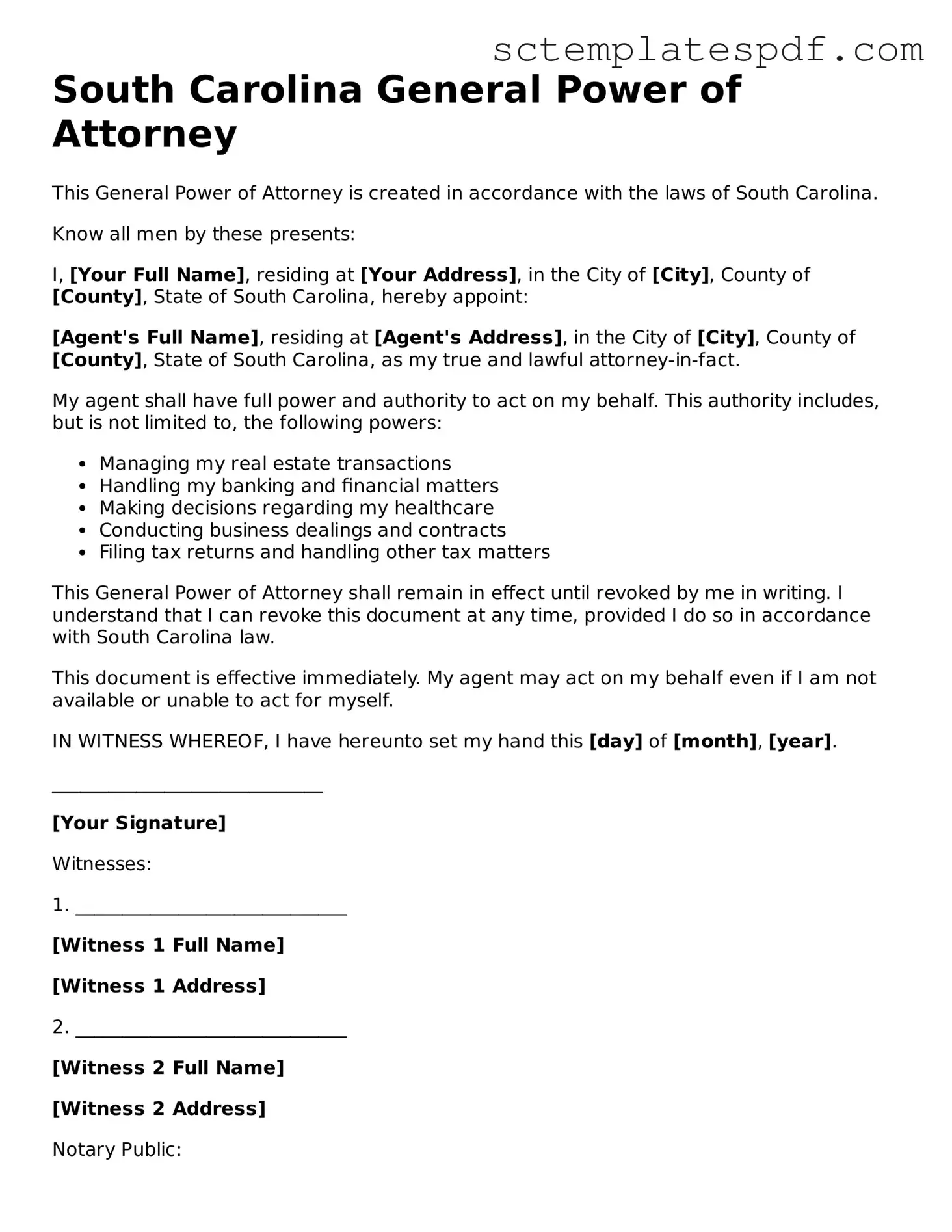Valid South Carolina General Power of Attorney Document
In South Carolina, the General Power of Attorney (GPOA) form serves as a vital tool for individuals seeking to grant someone else the authority to manage their financial and legal affairs. This document empowers a designated agent, often a trusted family member or friend, to act on behalf of the principal in a wide range of matters, from handling bank transactions to managing real estate. The GPOA can be tailored to fit specific needs, allowing the principal to outline the extent of the agent's powers, whether they are broad or limited. Importantly, this form can remain effective even if the principal becomes incapacitated, ensuring that their affairs continue to be managed seamlessly. Understanding the nuances of the GPOA is essential for anyone considering this arrangement, as it not only offers peace of mind but also helps in avoiding potential legal complications down the road. Whether you are planning for the future or addressing immediate needs, the South Carolina General Power of Attorney form is a crucial document that can simplify complex situations and provide clarity during challenging times.
Key takeaways
When filling out and using the South Carolina General Power of Attorney form, there are several important considerations to keep in mind. Here are key takeaways to ensure you navigate the process smoothly:
- Understand the Purpose: A General Power of Attorney allows you to designate someone to manage your financial and legal affairs if you become unable to do so.
- Choose Your Agent Wisely: Select a trusted individual, such as a family member or close friend, who will act in your best interest.
- Be Specific: Clearly outline the powers you are granting. This could include handling bank transactions, selling property, or making healthcare decisions.
- Consider Durability: Decide if the Power of Attorney should remain in effect if you become incapacitated. A durable Power of Attorney continues even if you are unable to make decisions.
- Sign and Date: Ensure that you sign and date the form in front of a notary public. This adds an extra layer of legitimacy to the document.
- Distribute Copies: After completing the form, provide copies to your agent, financial institutions, and any relevant parties to ensure they are aware of your decision.
- Review Regularly: Revisit your General Power of Attorney periodically. Life changes, such as marriage, divorce, or relocation, may necessitate updates to the document.
By keeping these takeaways in mind, you can effectively utilize the South Carolina General Power of Attorney form, ensuring your affairs are managed according to your wishes.
Dos and Don'ts
When filling out the South Carolina General Power of Attorney form, it’s important to approach the task with care. Here are some essential do's and don'ts to keep in mind:
- Do ensure you understand the powers you are granting. Familiarize yourself with what a General Power of Attorney entails.
- Do choose a trustworthy agent. Your agent will have significant authority over your financial and legal matters.
- Do sign the document in front of a notary public. This adds an extra layer of validity to your form.
- Do keep copies of the signed document. You may need to refer back to it or provide copies to relevant parties.
- Don't rush through the form. Take your time to read each section carefully and ensure all information is accurate.
- Don't overlook state-specific requirements. South Carolina has particular rules that must be followed for the document to be valid.
By following these guidelines, you can help ensure that your General Power of Attorney form is completed correctly and serves its intended purpose.
Guidelines on Utilizing South Carolina General Power of Attorney
Filling out the South Carolina General Power of Attorney form is a straightforward process. It is important to ensure that all information is accurate and complete. After completing the form, you will need to sign it in the presence of a notary public to make it legally binding.
- Obtain the South Carolina General Power of Attorney form from a reliable source or legal website.
- Begin by entering your full name and address at the top of the form.
- Identify the agent you are appointing. Provide their full name, address, and any relevant contact information.
- Clearly specify the powers you are granting to your agent. Be as detailed as possible to avoid confusion.
- Include the effective date of the power of attorney. You can specify if it is effective immediately or upon a certain event.
- Sign the form at the designated area. Make sure to do this in front of a notary public.
- Have the notary public sign and seal the document to validate it.
- Make copies of the completed and notarized form for your records and for your agent.
Other Popular South Carolina Forms
Free Printable Golf Cart Bill of Sale - Includes the Vehicle Identification Number (VIN) for identification.
In North Carolina, submitting the Homeschool Letter of Intent form is an essential process for families embarking on the homeschooling journey. This form not only serves as an official notification to the state but also reflects a family's commitment to providing a tailored educational experience for their children. Parents can find a convenient version of this form at https://homeschoolintent.com/editable-north-carolina-homeschool-letter-of-intent, ensuring they meet all necessary state regulations efficiently.
Do You Have to Be Separated for a Year to Get a Divorce in Sc - A Marital Separation Agreement allows couples to maintain respect for one another during a potentially challenging transition.
